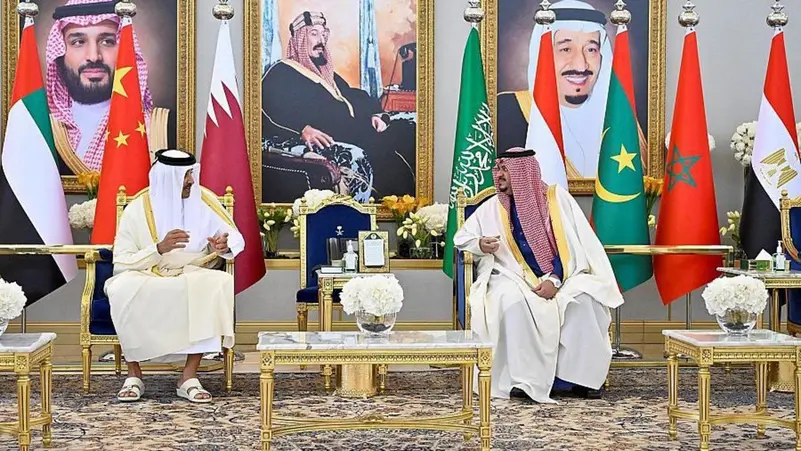Chinese President Xi Jinping will visit Arab leaders in the Saudi capital on Friday for key summits with GCC and Arab states.
Qatar’s Amir Sheikh Tamim bin Hamad Al Thani arrived in Saudi Arabia on Friday to participate in the China-Gulf and China-Arab summits.
Chinese President Xi Jinping will visit Arab leaders in the Saudi capital on Friday for summits he has referred to as “milestone events” that came at a time of economic turmoil and geopolitical realignment.
The conferences take place on the third and last day of Xi’s first trip to Saudi Arabia since 2016 and his third abroad trip overall since the coronavirus pandemic started.
He announced accords on everything from housing to hydrogen energy at a meeting with King Salman and Crown Prince Mohammed bin Salman, or MbS, on Thursday, though only a few specifics were made public.
The GCC nations have been significant partners for China for the past 41 years, according to the Chinese Foreign Ministry in Beijing.
It also noted that the GCC nations have set the pace for cooperation between China and the Middle Eastern countries with their productive cooperation in the areas of trade, energy, finance, investment, high-tech, aerospace, language, and culture, Qatar News Agency reported.
Among the heads of state who arrived on Thursday were Egyptian President Abdel Fattah El Sisi, Libya’s Presidency Council head Mohammed Al Menfi, and Tunisian President Kais Saied. Leaders from Lebanon, Iraq, Palestine, and other countries also planned to attend.
“China looks forward to working with Saudi Arabia and Arab countries to make the two summits milestone events in the history of China-Arab relations and China-GCC relations,” Xi said on Thursday in remarks carried by Chinese state broadcaster CCTV, according to reports.
As part of an Eastward shift that entails diversifying their fossil fuel-reliant economies, the Gulf countries, who are vital allies of Washington, are stepping up their relations with China.
The agenda for Friday has not been made public in full, but one potential topic of discussion is the long-debated free trade pact between China and the GCC.
“China will want to draw the lengthy negotiations to a close, as FTAs with major trading blocs is a matter of prestige for Beijing,” said Robert Mogielnicki of the Arab Gulf States Institute in Washington, reports said.
“It’s not as simple for the GCC states, which seem to be more invested in advancing bilateral ties and are engaged in varying degrees of regional economic competition with their neighbouring member states.”
In 2021, imports of crude oil from the GCC countries exceeded the threshold of 200 million tons, and the total volume of trade between the two sides exceeded USD 230 billion.
A resolution in the trade negotiations might assist Saudi Arabia, according to the report, one of the world’s largest exporter of oil, in diversifying its economy in line with the MbS-backed Vision 2030 reform goal.
Thirty-four investment agreements between Saudi and Chinese enterprises were signed during the first day of the Chinese president’s three-day visit to the Kingdom, according to the official Saudi Press Agency – agreements reportedly worth around $30 billion.
Among the inked agreements, Saudi Arabia and China covered a wide range of industries, including green energy, green hydrogen, photovoltaic energy, information technology, cloud services, transportation, logistics, medical industries, housing and construction factories.
When asked about the Xi visit, John Kirby, a spokesperson for the White House National Security Council, told reporters that Gulf countries remained key US allies.
“We are mindful of the influence that China is trying to grow around the world. The Middle East is certainly one of those regions where they want to deepen their level of influence,” said Kirby.
The closer approach to a relations with China, a historic US rival, came as the US gradually forgoes the close-knit relation it enjoyed with some Gulf countries, such as Riyadh and Abu Dhabi.







